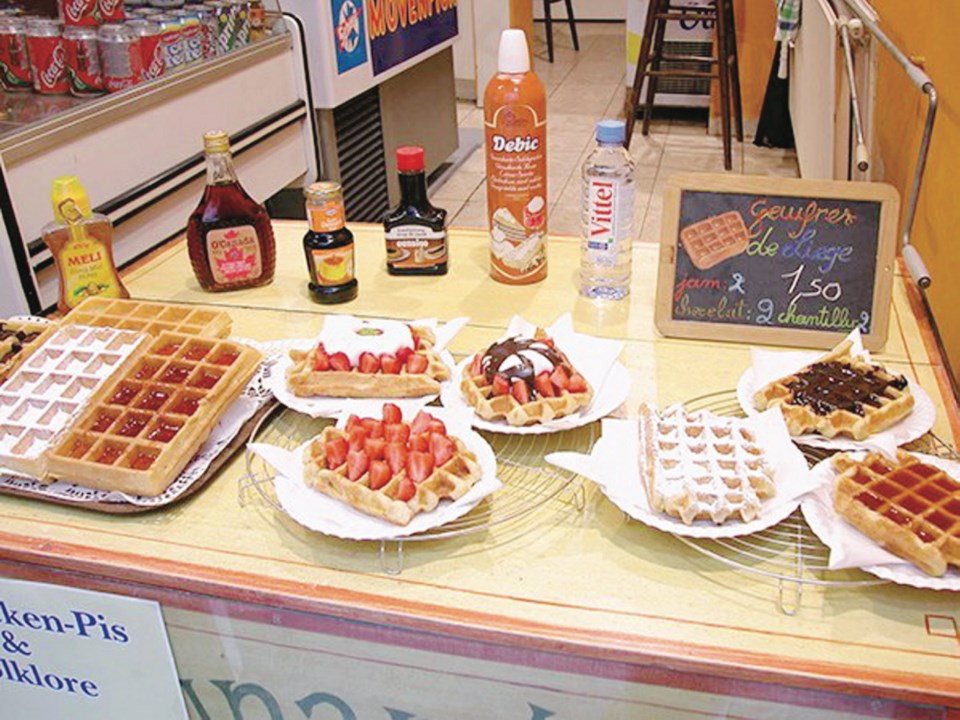Whenever I think of Belgium, I recall digging into a dish of mussels while seated on a sunny square in Brussels, in the shadow of a lacy medieval spire. My waiter bragged: “In Belgium, we eat as hearty as the Germans and as fine as the French.”
Belgium is where France meets northern Europe — and you can taste the cultural influences. The Flemish (Dutch-speaking natives of Flanders — now northern Belgium) were ruled by the dukes of Burgundy, and absorbed some of the fancy French cuisine of their overlords. That’s not to say, however, that Belgian fare doesn’t have its own flair. For example, Belgians have perfected the art of cooking with their own unique beers, imbuing the cuisine with a hoppy sweetness. While the French might rub the rind of their cheeses with wine or hard alcohol, the Belgians infuse their cheese with extra flavour by rubbing it with beer.
If a dish is cooked Flemish-style (à la flamande), that usually means it’s either made with beer or smothered in a sauce of butter, chopped parsley and a crumbled hard-boiled egg. Look for lapin à la flamande (konijn met pruimen, in Dutch) — marinated rabbit braised in onions and prunes; meatballs (balletjes/ boulets in Dutch/French) served Liège-style — with a dark syrup of apples, pears and dates; and the warm Liège salad (green beans, potatoes, tomatoes and bacon). Stews abound: Ghent’s creamy waterzooi (made with chicken, eel or fish), stoofvlees/carbonnade (beef stew with onions, mustard and beer) … and of course biersoep/soupe à la bière — beer soup.
Mussels are perhaps the most famous of Belgium’s signature dishes. The classic preparation is à la marinière: cooked in white wine, onions, celery, parsley and butter (though some cooks use light Belgian beer for the stock). For a high-calorie version, moules à la crème is thickened with heavy cream. You’ll also find them served plain, with white wine or in a tomato sauce (provençale). From about mid-July through April, you’ll get the big Dutch mussels (most are from the coastal Zeeland area to the north). Locals take a break from mussels in May and June, when only the puny Danish kind are available.
The mussels come with another Belgian specialty on the side, frieten — what we call “french fries” and the Dutch call “Flemish fries.” In Belgium, fries are an art form. Just like every village in England has its “chippy” (for fish and chips), and every German burg has its wurst stand (for sausages), every Belgian town has a favoured frietkot (fry shack, also called a frituur). The fries are extra-delicious because they’re deep-fried twice — once to cook them and once to brown them. The best fries are cooked to a crisp in flavourful ox fat.
The town of Bruges even has a museum — to my knowledge, the only one like it in the world — devoted to the art and history of the fried potato. But skip the museum and instead find the nearest frituur to sample the real thing.
Flemish fries are generously topped with sauces such as mayonnaise (the most traditional), tartar sauce, curry ketchup or currysaus (without the ketchup). Ketchup is sometimes available for the Yankees, but I encourage you to skip it and go on a sauce adventure. When I see a sauce that’s scary sounding — maybe joppiesaus (sweet yellow curry and onion) or “samurai sauce” (mayo with spicy chili flavour and a hit of tomato) — I go for it.
Belgium is justifiably famous for its exquisite chocolates. But make sure to save room for another sweet Belgian specialty — waffles. You’ll see little windows, shops, and trucks selling them either plain (for Belgians and purists) or topped with fruit, jam, chocolate sauce, ice cream, or whipped cream (for tourists). Belgians recognize two general types of waffles. The common take-out version is the dense, sugar-crusted and very sweet Liège-style waffle, usually served warm. Brussels-style waffles are lighter and fluffier, dusted with powdered sugar, and sometimes topped with marmalade. Though Americans think of waffles as a breakfast food, Belgians generally have them as a late-afternoon snack.
Keep in mind that, while Belgians eat lunch when we do, they eat dinner later. If you dine earlier than 7:30 p.m. at a restaurant, you’ll eat alone (or with other tourists). Also beware that Belgian restaurants almost always charge for tap water or might refuse to serve it altogether. Of course, if you need something sudsy to wash down those mussels and fries, those crafty Belgians have just the thing.
Hungry? Belgium is ready for you.
Rick Steves () writes European travel guidebooks and hosts travel shows on public television and public radio. Email him at [email protected] and follow his blog on Facebook.


